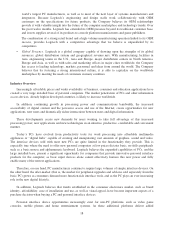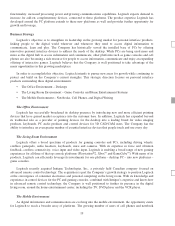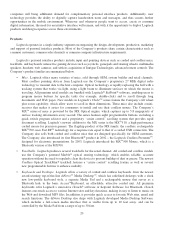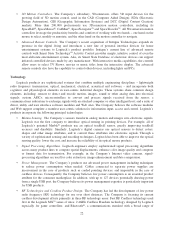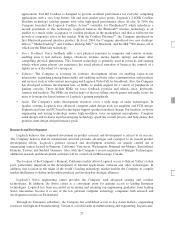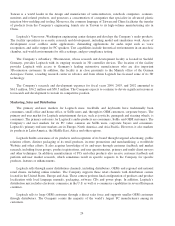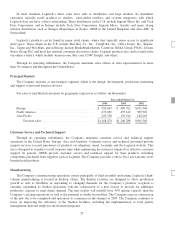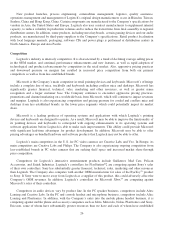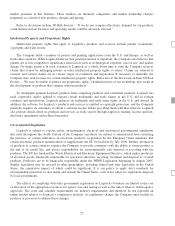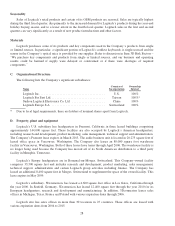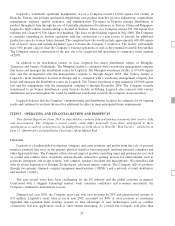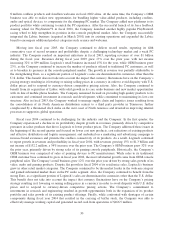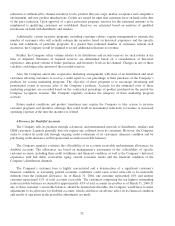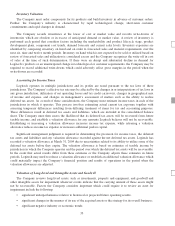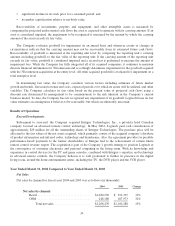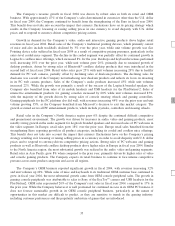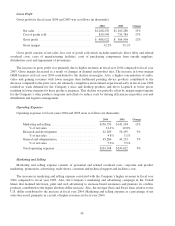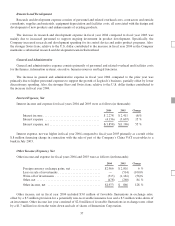Logitech 2004 Annual Report Download - page 65
Download and view the complete annual report
Please find page 65 of the 2004 Logitech annual report below. You can navigate through the pages in the report by either clicking on the pages listed below, or by using the keyword search tool below to find specific information within the annual report.
market positions in this business. These markets are intensely competitive and market leadership changes
frequently as a result of new products, designs and pricing.
Refer to discussion in Item 3D Risk Factors – “If we do not compete effectively, demand for our products
could decline and our business and operating results could be adversely affected.”
Intellectual Property and Proprietary Rights
Intellectual property rights that apply to Logitech’s products and services include patents, trademarks,
copyrights and trade secrets.
The Company holds a number of patents and pending applications from the U.S. and Europe, as well as
from other countries. While Logitech believes that patent protection is important, the Company also believes that
patents are of less competitive significance than factors such as technological expertise, ease-of-use, and quality
design. No single patent is in itself essential to Logitech as a whole. From time to time the Company receives
claims that it may be infringing patents or other intellectual property rights of others. Claims are referred to
counsel, and current claims are in various stages of evaluation and negotiation. If necessary or desirable, the
Company may seek licenses for certain intellectual property rights. Refer also to the discussion in Item 3D Risk
Factors – “We may be unable to protect our proprietary rights. Unauthorized use of our technology may result in
the development of products that compete with our products.”
To distinguish genuine Logitech products from competing products and counterfeit products, Logitech has
used, registered, and/or applied to register certain trademarks and trade names in the U.S. and in foreign
countries and jurisdictions. Logitech enforces its trademark and trade name rights in the U.S. and abroad. In
addition, the software for Logitech’s products and services is entitled to copyright protection, and the Company
generally requires its customers to obtain a software license before providing them with that software. Logitech
also protects details about its products and services as trade secrets through employee training, license and non-
disclosure agreements and technical measures.
Governmental Regulation
Logitech is subject to various safety, environmental, electrical and mechanical governmental regulations
that exist throughout the world. Certain of the Company’s products are subject to international laws restricting
the presence of certain substances in electronic products. Legislation by the European Union mandates that
certain electronic products manufactured or supplied into the EU be lead-free by July 2006. Further, production
of products in certain countries requires the Company to provide consumers with the ability to return product at
the end of its useful life, and places responsibility for environmentally safe disposal or recycling with the
producer. The EU has finalized the Waste Electrical and Electronic Equipment Directive, which makes producers
of electrical goods, financially responsible for specified collection, recycling, treatment and disposal of covered
products. Producers are to be financially responsible under the WEEE Legislation beginning in August 2005.
Similar legislation may be enacted in other geographies, including federal and state legislation in the United
States, the cumulative impact of which could be significant. It is our policy to apply strict standards for
environmental protection to sites inside and outside the United States, even if not subject to regulations imposed
by local governments.
The effects of complying with other government regulations on Logitech’s business are limited to the cost
of allocation of the appropriate resources for agency fees and testing as well as the time it takes to obtain agency
approvals. The costs and schedule requirements are industry requirements and therefore do not represent an
undue burden relative to Logitech’s competitive position. As regulations change, the Company must modify its
products or processes to address these changes.
27



